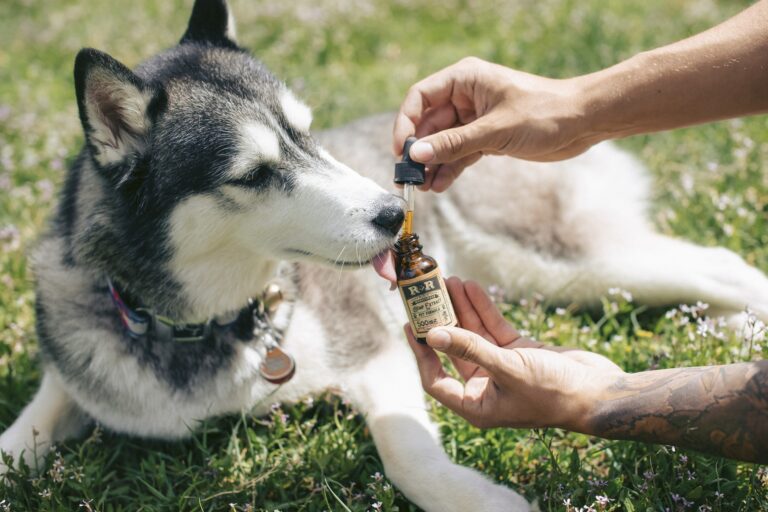The Role of CBD in Managing Seasonal Allergies in Dogs
Seasonal allergies aren’t just a human issue; our canine companions can suffer from them too. With symptoms like itching, redness, and sneezing, allergies can significantly impact a dog’s quality of life. As natural remedies gain popularity, CBD has emerged as a potential option for managing these seasonal allergies. But what exactly is the role of CBD in alleviating these symptoms in dogs? Let’s explore this in detail.
Understanding Seasonal Allergies in Dogs
Seasonal allergies, also known as atopic dermatitis, occur when a dog’s immune system overreacts to environmental allergens. These allergens, which include pollen, mold, and dust mites, are more prevalent during specific seasons. This section explains what seasonal allergies are and their impact on dogs.

What Are Seasonal Allergies?
Seasonal allergies in dogs manifest when their immune system identifies harmless environmental substances as threats. This reaction triggers a series of symptoms that can cause considerable discomfort. Common signs include excessive scratching, inflamed skin, and sneezing.
Why Consider CBD for Seasonal Allergies?
CBD, a compound derived from hemp, interacts with the endocannabinoid system (ECS) in dogs. This interaction can help regulate immune responses and reduce inflammation, making it a promising option for managing allergies. Unlike traditional treatments, CBD offers a natural alternative with fewer potential side effects.
How CBD Can Help Manage Seasonal Allergies in Dogs
CBD’s role in managing seasonal allergies revolves around its anti-inflammatory and immune-modulating properties. This section discusses how these properties help alleviate allergy symptoms in dogs, offering a natural way to manage discomfort.
Anti-Inflammatory Properties
One of the primary reasons CBD is effective in managing allergies is due to its anti-inflammatory properties. Allergic reactions in dogs often lead to inflammation, causing itching and irritation. CBD can help reduce this inflammation, providing relief.
Reducing Itching and Skin Irritation
By reducing inflammation, CBD can help soothe the skin and minimize the itchiness that drives dogs to scratch and bite. This not only improves comfort but also prevents secondary infections that can arise from constant scratching.
Immune System Modulation
CBD’s interaction with the endocannabinoid system allows it to modulate the immune response, which is crucial in managing allergies. A balanced immune response can reduce the severity of allergic reactions, making symptoms more manageable.
Supporting Overall Immune Health
In addition to directly addressing allergy symptoms, CBD supports overall immune health. A well-balanced immune system can help prevent the onset of severe allergic reactions, offering long-term relief for dogs suffering from seasonal allergies.
Administering CBD to Dogs with Seasonal Allergies
When considering CBD for your dog’s allergies, it’s essential to choose the right product and administer it correctly. This section covers the best practices for selecting and using CBD to manage your dog’s seasonal allergies effectively.
Choosing the Right CBD Product
Selecting a high-quality CBD product is crucial for achieving the desired benefits. Look for products specifically formulated for pets that are free from THC, tested by third-party labs, and made from organic hemp. Ensuring these factors helps maximize the safety and effectiveness of the CBD treatment.
Proper Dosage and Administration
Determining the correct dosage of CBD for your dog is essential. Start with a low dose and gradually increase it based on your dog’s size, symptoms, and response. It’s always recommended to consult with a veterinarian who understands CBD usage for pets to find the optimal dose.
Incorporating CBD into Your Dog’s Routine
Consistency is key when using CBD for managing allergies. Incorporate it into your dog’s daily routine by mixing it with food, administering it directly, or using CBD-infused treats. Regular use helps maintain steady CBD levels in the system, providing continuous relief.
Potential Side Effects and Considerations
While CBD is generally safe for dogs, it’s essential to monitor their response, especially when starting the treatment. This section highlights the potential side effects and important considerations when using CBD for allergies in dogs.
Monitoring Your Dog’s Response
Some dogs may experience mild side effects like drowsiness or gastrointestinal upset when starting CBD. If you notice any adverse reactions, reduce the dosage or discontinue use and consult your veterinarian for guidance.
Integrating CBD with Other Treatments
CBD can be used alongside traditional allergy treatments like antihistamines or medicated shampoos. However, it’s crucial to consult your veterinarian to ensure there are no interactions between treatments. This integrated approach can provide comprehensive relief for your dog’s seasonal allergies.
The Future of CBD in Canine Allergy Management
As research into CBD’s effects on dogs continues, its potential in managing seasonal allergies becomes increasingly promising. This section explores the growing interest in CBD and its future in canine allergy management.
Growing Research and Potential Benefits
CBD is a relatively new area of study for managing canine allergies, but early research and anecdotal evidence suggest it could become a key part of holistic allergy management. As more studies are conducted, we’ll likely discover even more benefits and applications of CBD for dogs.
A Holistic Approach to Canine Health
CBD is just one part of a broader strategy for managing seasonal allergies in dogs. A holistic approach, including a balanced diet, regular grooming, and avoiding known allergens, is essential for comprehensive care. Incorporating CBD into this approach can help your dog lead a healthier, more comfortable life.
Conclusion
Seasonal allergies can be a significant source of discomfort for dogs, but with the right approach, including the use of CBD, managing these symptoms is possible. CBD’s anti-inflammatory properties, immune modulation, and overall support for skin health make it a promising natural remedy. Always consult with a veterinarian before starting any new treatment to ensure the best outcome for your pet.







